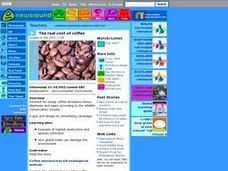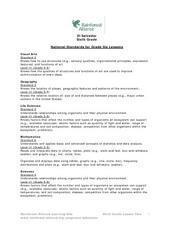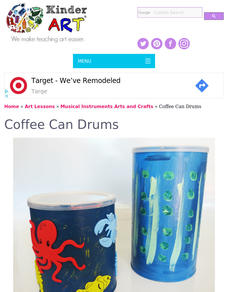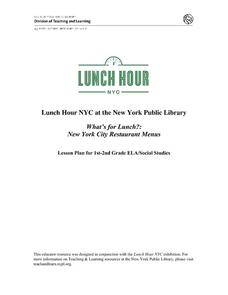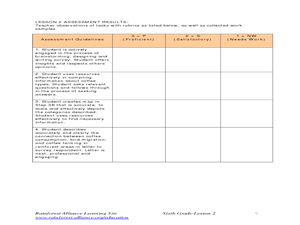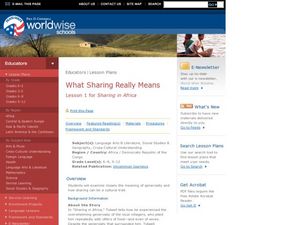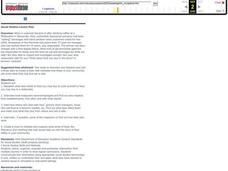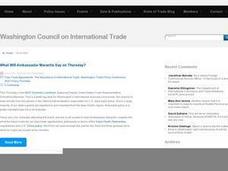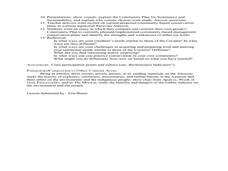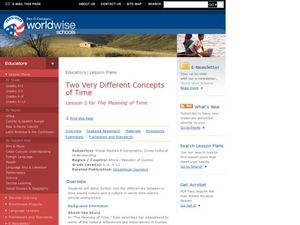Curated OER
The Coffee and Conservation Connection
Students explore the connection between low cost coffee and wildlife conservation. Students working in groups devise a marketing campaign for a new brand of coffee, grown in a less environmentally damaging way.
Curated OER
Track the Path of Coffee From Farm to Store Shelf
Students investigate the cultivation and marketing of coffee. In this global studies instructional activity, students consider the connections of the 21st century world as they explore how coffee makes it from farms to their homes....
Curated OER
El Salvador: How Can My Breakfast Harm the Birds?
Sixth graders explore how their food choices can have an impact on the rain forests. They examine coffee farming and how their techniques can harm birds in the rain forest. Students design two farms with sustainability of bird habits in...
Curated OER
El Salvador: Whose Breakfast Isn't for the Birds?
Sixth graders investigate the understanding of where coffee is grown by conducting a survey. They study the natural history of coffee and examine bird habitats in the areas where coffee is grown. They write letters to explaining the...
Curated OER
The Drum
Students complete a variety of activities related to the folktale from India, "The Drum." They listen to the story and answer comprehension questions, construct a coffee can drum, and complete a phonics and matching worksheet.
Curated OER
Coffee Makes the World Go Round
Students examine the concept of "fair trade coffee," then research facts about coffee and the coffee industry and create original exhibits to be included in a "Global Coffee Awareness Fair."
New York Public Library
What's for Lunch?: New York City Restaurant Menus
Do you remember the days when a cup of coffee cost five cents? At A.W. Dennett restaurant in 1894, you could buy a five-cent cup of coffee and as well as a five-cent slice of pie to accompany it. The menu from that year is a primary...
Curated OER
Deck the Halls with Literature Trees
Reinforce and assess reading comprehension by having your class make a literature tree! After reading a book, pupils make decorations to represent the book's themes, characters, and setting. Materials for decorating can be as diverse and...
Curated OER
Whose Breakfast isn't for the Birds?
Students explore coffee production. In this cross-curriculum rainforest ecology lesson, students research regions where coffee comes from and investigate how the native birds in the rainforest are effected by coffee...
Curated OER
Breaking News English: Drinking Wine Can Rot Your Teeth
In this English worksheet, students read "Drinking Wine Can Rot Your Teeth," and then respond to 1 essay, 47 fill in the blank, 7 short answer, 20 matching, and 10 true or false questions about the selection.
Curated OER
What Sharing Really Means
Students examine the meaning of generosity and how sharing can be a cultural trait. In this cultural trait lesson, students read a text about the culture of generosity in Africa. Students complete a discussion activity and journal activity.
Curated OER
Economic Health Indicators: GDP and CPI Worksheet
Examine the nation's economic health using this GDP and CPI learning exercise, which features helpful graphic depictions of complex concepts. The first 2 pages include 17 short-answer questions intended to guide reading from a text (not...
Curated OER
Interesting Facts about the Historic Trails
The Oregon trail is a very interesting part of American history. The class, having read or discussed the events leading to the westward expansion and settling of the Oregon Territory, can answer each of these fill-in-the-blank...
Curated OER
Ways To Go Green
In this environmental awareness learning exercise, students learn how to "go green" by reading 10 tips that can be used in everyday life. Students answer 10 multiple choice questions. This is an online interactive learning exercise.
Curated OER
Souper Philanthropists: The Drive
Students understand how good- hearted people can make a difference to others. For this philanthropy lesson, students hear the story of a child who eats in a soup kitchen (Uncle Willie and the Soup Kitchen) and answer questions. Students...
Curated OER
Recognizing How Another Culture Differs From One's Own
Students identify and understand the significant cultural traits described by the author. They discover how the concepts of time and punctuality can differ markedly in the United States and another country and determine that In some...
Curated OER
McDonald's and 'Spiked' Coffee
Students explore food safety. Pupils research what laws relate to food you cook yourself, food you may buy in a restaurant and food bought in a grocery store. They interview food inspectors. Students create a chart to indicate who...
Curated OER
Trade Creates Opportunities
High schoolers examine how trade can create economic opportunities and can be a impetus for social change. They research the "Asian Tigers" and design a class presentation.
Curated OER
Homelessness
Students explore the importance of soup kitchens. In this philanthropy instructional activity, students brainstorm ways they can be philanthropists. Students watch a puppet show about a young girl who doesn't have enough to eat at home...
Curated OER
Supermarkets, Sustenance and Sustainability
Students investigate jungles and the people who depend upon them. In this sustainability instructional activity, students research wild life conservation and discover the importance of a jungle to Amazonian people. Students...
Curated OER
Two Very Different Concepts of Time
Students delve further into the differences between a time-bound culture and a culture in which time seems almost unimportant. They answer the questions: How do people of different cultures view time differently? What can we learn from...
Curated OER
Holidays: Often Happy, Sometimes Sad
Students examine holiday stress. In this current events lesson, students read the provided article "Holiday Stories from Street Corner and Coffee Shop." Students respond to the provided discussion questions.
Curated OER
Trade Creates Opportunities for Individuals
Students examine how trade can be a vehicle for the alleviation of poverty. They conduct Internet research, analyze organizations that help to alleviate poverty, and create a business plan for a micro business for a developing economy.
